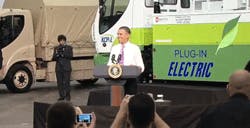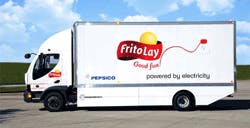“Those selling components for electric vehicles and those wishing to make the vehicles themselves must seek where the majority of the money is spent and will be spent,” according to Dr. Peter Harrop, chairman of the IDTechEx consultancy firm. “That must lead them to industrial and commercial electric vehicles, because today these represent 60 percent of the value of the electric vehicle market,” he says.
Like this article? Sign up for our enews blasts here.
“Indeed, this sector is set to grow 4.2 times in the next decade,” adds Harrop, co-author with colleague Raghu Das of a report entitled Industrial and Commercial Electric Vehicles 2012-2022.
Having procured a $32 million grant under the American Recovery and Reinvestment Act and $36 million in private capital, the Smith Electric Vehicles Corp. is in the process of producing 500 all-electric trucks for the U.S. marketplace.
Unveiled earlier this year, Smith’s new Newton Step Van EV features the functionality of a walk-in body manufactured by Utilimaster Corp., an Indiana-based subsidiary of Spartan Motors, Inc.
“The innovation and product performance found in the Newton Step Van sets a new industry standard for alternative propulsion walk-in vans,” says John Knudtson, Utilimaster’s vice president of product development. The technology’s rollout “offers our clients an affordable green solution with a reliable all-electric vehicle platform.”
Equipped with proprietary Smith Drive, Smith Power and Smith Link systems that provide “superior powertrain performance, battery management efficiency and remote system monitoring,” the vehicle is available in gross vehicle weight configurations of 14,000 to 26,000 pounds and 650 to 1,200 cubic feet.
Delivering a top speed of 55 mph, it has a range of 50 to 150 miles on a single charge with a payload of more than 16,000 pounds.
“Our partnership with Utilimaster combines their vehicle integration expertise with Smith’s experience in all-electric vehicle deployment to create a driver experience that is familiar to diesel, but with all of the benefits of electric – silent operation, no diesel fumes and no diesel fuel expense,” reports Angela Strand, Smith’s chief marketing officer and vice president of business development.
Established 80 years ago in England, Smith has revamped an 80,000-square-foot former jet engine overhaul facility in Missouri near the Kansas City International Airport to produce the Newton, and a second plant is being added in New York.
“This expansion reflects an important step in executing Smith’s localized assembly, sales and service strategy,” says Smith Chairman and CEO Bryan Hansel. “Our approach creates jobs, provides Smith customers with more localized support and significantly reduces the costs associated with shipping completed vehicles to our customers.”
Coca-Cola, which assisted in launching Smith’s efforts in the U.S., has four Newtons covering congested delivery routes in both the Big Apple and Washington, D.C.
“Smith’s presence in New York City, coupled with the state’s incentive program, will help us accelerate conversion in New York as we continue to build a more efficient and environmentally friendly Coke fleet,” notes Steven Saltzgiver, Coke’s director of fleet operations.
Based on current fuel prices, the vehicles offer a fuel cost that is as much as 75 percent lower than diesel, along with eliminating noise pollution through their virtually silent operational capabilities, according to Frito fleet director Mike O’Connell.
“With the seventh-largest privately owned fleet in the U.S., we have set a goal of becoming the most fuel efficient fleet in the country, and these vehicles give us an opportunity to use the latest advances in transportation technology as a significant way to reduce our environmental impact,” he says. “It operates at peak effectiveness in urban applications that demand heavy ‘stop-and-go’ driving.”
FedEx is another satisfied corporate client.
“This opportunity helps support our goal to optimize and operate our vehicle fleet in an economically and environmentally sustainable manner,” says Dennis Beal, FedEx’s vice president of global vehicles. “Smith’s global footprint and track record of successful EV deployments make it an ideal collaborator as FedEx continues to improve its fleet efficiency, reducing emissions while providing the best possible service to our customers around the world,” he adds.
“The leadership shown by FedEx in adopting all-electric vehicles has been instrumental to growing the industry,” says Smith’s Hansel. “We welcome FedEx and look forward to successful global vehicle deployments that demonstrate the economic and environmental benefits of fleet electrification.”
For more information, visit www.smithelectric.com and www.idtechex.com.



